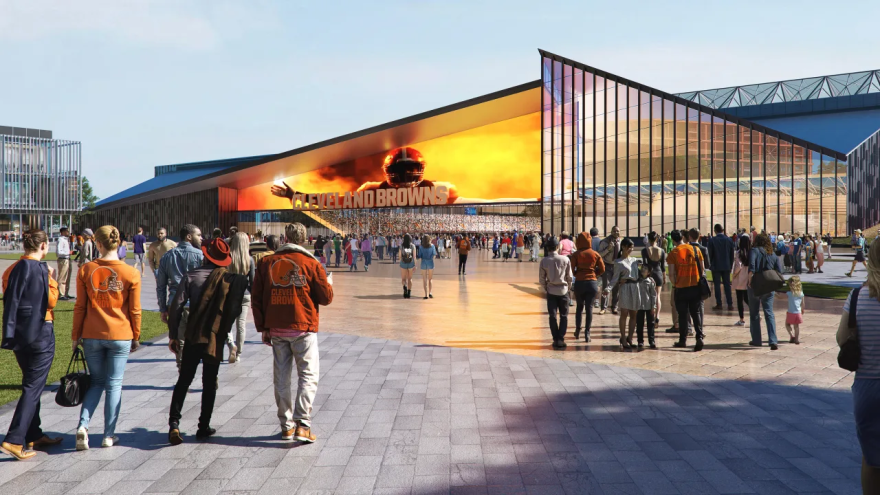The Cleveland Browns appear to be finalizing their decision to move the team from Downtown Cleveland to the neighboring suburb of Brook Park as renderings of a new, $2.4 billion domed stadium were released Wednesday.
In a letter released Wednesday afternoon, the team's ownership indicated that the Brook Park site, which they purchased earlier this year, is the "most compelling" option, citing a central location for a regional fan base with proximity to Downtown, public transit and Cleveland-Hopkins Airport.
"While we are excited about the possibility of building a dome and surrounding development in Brook Park, the City of Cleveland and the success of its downtown remain incredibly important to us," wrote Dave Jenkins, the Chief Operating Officer of the Haslam Sports Group, which owns the team. "We acknowledge that a move to Brook Park may have a near-term impact on downtown, but we believe that the year-round activity of a domed stadium can still positively impact the downtown economy, particularly when coupled with the possibilities of a reimagined lakefront absent the stadium."
The announcement comes nearly a week after Cleveland officials unveiled a $461 million bid to incentivize the Browns to re-up their lease at the city-owned stadium when it expires in 2028.
Mayor Justin Bibb requested a response to that offer, which is mostly funded by an admissions sales tax and a county sin tax on cigarettes and alcohol, by August 12. In the letter, Jenkins said ownership is currently evaluating the deal and has requested additional information from the city.
"We do not take the stadium decision lightly, and have been working diligently with city, county and state officials to consider all opportunities," Jenkins wrote. "We need to be bold, we need to be innovative, and we need to take advantage of this unique moment to create a transformational project not only for our fans, but for Cleveland, the Northeast Ohio region and the State of Ohio."

Jenkins said Brook Park was not the only consideration for a stadium site. He said the team is still open to staying Downtown in a renovated stadium, but said there are "significant operational limitations" that would require "major infrastructure moves." The Browns said they also explored a move to the site of the Burke Lakefront Airport, but ruled that option out after they determined with the city it was not "feasible" due to economic constraints and Federal Aviation Administration limitations.
"While significant work remains, the more we have explored the Brook Park option, the more attractive it has become," Jenkins said.
It could be a major blow to Mayor Bibb's sweeping, decades-long lakefront master plan unveiled earlier this week. Even with the Browns' decision looming, he said the city plans to proceed regardless, but he and other members of his administration emphasized how vital the team is to existing Downtown investments and the local economy.
"I want to make sure that we maintain this civic asset, maintain civic pride and keep the Browns in the great city of Cleveland, Ohio," Bibb said at a public forum Monday. "But regardless if the Browns stay or not, we will remake our lakefront once and for all."
On the other hand, Jenkins said the vacant space left by the Browns could be an opportunity for the city.
"Developing the lakefront without the stadium could be the best way to maximize the long-term success of our underutilized North Coast waterfront asset," he wrote. "We continue to have dialogue with the City regarding the optimal use of the lakefront, and will remain engaged on this critical priority regardless of where the stadium is."
The City of Cleveland did not immediately respond to a request for comment.
How will the team pay for a more than $2 billion stadium?
With such a hefty price tag, the Browns say the only way to fund the project is through a 50-50 public-private partnership on funding — excluding cost overruns, which the team would foot.
That means the Browns plan to privately invest $1.2 billion toward the stadium and will be looking at local, county and state governments for the rest.
This ask could prove unpopular, as some residents, members of Cleveland City Council and state officials have already been critical of handing over public money to a team owned by billionaires — especially as Cleveland, the second poorest city in the country, faces other issues related to gun violence, poverty and education.
But Jenkins said the team is not looking to tap into "existing taxpayer-funded streams, which could divert resources from other pressing needs."
"While still in progress, our funding model also contemplates setting aside future dollars generated by the project for stadium repairs and maintenance to help ensure long-term sustainability of the building well beyond the initial lease term."






